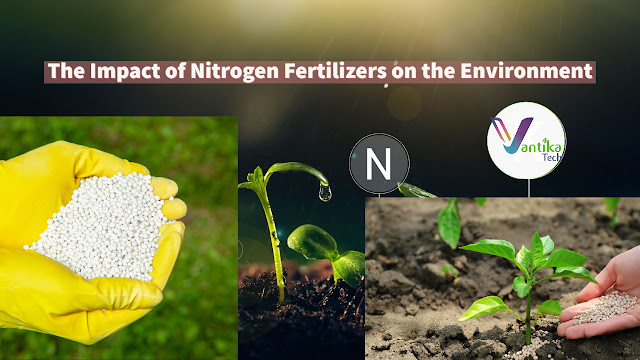 |
| Impact of Nitrogen |
Nitrogen fertilizers are a vital component of modern agriculture, supporting crop growth and increasing agricultural productivity. However, their excessive and improper use can have significant environmental implications. In this comprehensive blog, we will delve into the various aspects of the impact of nitrogen fertilizers on the environment, exploring the causes, consequences, and sustainable solutions to mitigate these effects.
Nitrogen Fertilizers and Water Pollution:
The primary concern associated with nitrogen fertilizers is water pollution. When applied in excessive amounts or at inappropriate times, nitrogen fertilizers can be carried away by runoff into nearby water bodies, including rivers, lakes, and groundwater. This excess nitrogen leads to a process called eutrophication, where nutrient overload causes algal blooms. These blooms deplete oxygen levels, harming aquatic life and disrupting the entire ecosystem.
Greenhouse Gas Emissions:
Nitrogen fertilizers also contribute to greenhouse gas emissions, particularly nitrous oxide (N2O). During the application and subsequent microbial processes in the soil, nitrogen fertilizers can release N2O, a potent greenhouse gas with a significantly higher warming potential than carbon dioxide. This contributes to climate change and global warming.
Soil Degradation and Nutrient Imbalance:
Improper use of nitrogen fertilizers can lead to soil degradation and nutrient imbalances. Excessive nitrogen application without proper management practices can result in soil acidification, reduced soil fertility, and a decline in beneficial soil microorganisms. Furthermore, the overuse of nitrogen fertilizers can disrupt the balance of other essential nutrients, such as phosphorus and potassium, leading to nutrient imbalances in the soil, negatively impacting plant health and overall soil quality.
Impact on Biodiversity:
The environmental impact of nitrogen fertilizers extends to biodiversity. Eutrophication caused by nitrogen runoff can harm aquatic ecosystems, affecting fish populations, amphibians, and other aquatic organisms. Moreover, excessive nitrogen availability in the soil can favor the growth of certain plant species over others, altering plant communities and potentially reducing biodiversity in agricultural landscapes.
Sustainable Solutions:
To mitigate the environmental impact of nitrogen fertilizers, adopting sustainable practices is crucial. Here are some sustainable solutions that can help minimize the negative effects:
Precision Agriculture: Implementing precision agriculture techniques, such as site-specific nutrient management, can optimize fertilizer application, reduce nitrogen losses, and improve overall efficiency.
Organic Farming: Embracing organic farming practices can reduce reliance on synthetic nitrogen fertilizers by utilizing organic alternatives, such as compost, green manure, and biological nitrogen fixation.
Cover Cropping and Crop Rotation: Introducing cover crops and practicing crop rotation can enhance soil health, increase nutrient cycling, and reduce the need for external nitrogen inputs.
Nutrient Management Planning: Developing comprehensive nutrient management plans tailored to specific crops and soil conditions can optimize fertilizer use, minimizing environmental impacts.
Innovative Technologies: Embracing innovative technologies, such as sensor-based systems, remote sensing, and data analytics, can enhance nutrient management precision, reducing fertilizer waste and environmental consequences.
Conclusion:
The impact of nitrogen fertilizers on the environment is a significant concern that requires urgent attention. By understanding the causes and consequences, we can adopt sustainable farming practices to minimize environmental damage. Implementing precision agriculture, organic farming, cover cropping, crop rotation, and innovative technologies can contribute to a more sustainable and environmentally friendly agricultural system. Let us strive for a balanced approach that ensures long-term agricultural productivity while safeguarding the health and well-being of our ecosystems.
Thank you for joining us on this exploration of the impact of nitrogen fertilizers on the environment. Your commitment to sustainable agriculture is vital in shaping a greener and more sustainable future.
#nitrogenfertilizers #environmentalimpact #waterpollution #eutrophication #greenhousegasemissions #soildegradation #nutrientimbalance #biodiversity #sustainablesolutions #precisionagriculture #organicfarming #covercropping #croprotation #nutrientmanagement #innovativetechnologies #sustainableagriculture







No comments:
Post a Comment